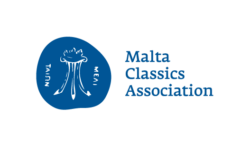This course is intended to focus on Malta during the Punic and Roman periods by drawing on a mixture of literary and archaeological evidence for the period. These sources will be examined and discussed critically in the context of broader controversies, scholarly debates and theories. By the end of this course students will (a) have a clearer understanding of the role that Malta played in the political, military and economic history of the empire (b) gain a broad understanding of the collaborative roles of literary and archaeological evidence in Ancient World research (c) develop tools for the critical analysis of literary works and archaeological sites from the Classical period and (e) gain an understanding of the history of the use of the
Classical period in later periods and ongoing efforts for the cultural heritage from the period. All 10 sessions (2hrs each) will be held online. Kindly check the table below for specific dates of lessons. All lessons will be running from 6.15pm till 8.15pm on the indicated days.
The course fee is €100 (€80 for registered MCA members) payable via ban transfer, Revolut, PayPal or BOV Mobile. To register for the course or to ask for more information, kindly email the MCA on [email protected].
| 1 August | The secondary aim of this lecture is to introduce students to the course structure and teaching method. Additionally, students will be introduced to the array of Classical sources that reference Malta as well as providing them with a very quick overview of the wealth of archaeological sites from the period. |
| 8 August | The purpose of this lecture is to discuss scholarship on the Roman economy and to briefly introduce students to Roman conceptualisation of the empire-wide economy. A brief mention of the written sources referencing the Maltese context will be made in preparation for the following session. |
| 22 August | This lecture will seek to contextualise and exemplify the state of the economy and industry in Malta within the wider imperial context by referencing relevant archaeological sites on land and at sea. |
| 29 August | This lecture will introduce students to material evidence that can give us indication on the life of people living in Roman Malta. The lecture will focus on aspects of everyday life such as religion, leisure activities, and local politics. |
| 5 September | The purpose of this lecture is to discuss how imagery was used in the imperial power to project power and apply it to the Maltese context with particular reference to the Julio-Claudian statuary found in Malta (esp. Domus). |
| 12 September | The purpose of this lecture is to introduce students to Roman approaches to death and the traditions and rituals generally associated with it. |
| 19 September | The purpose of this lecture is to offer insight on the different types of tombs and local burying practices in Malta during the Roman and late Roman period. |
| 26 September | This lecture will consider the role of language in the study of the peoples of the Roman empire, and how it can be used to understand how they perceived themselves and their identity. The lecture will then pivot to focus on the scholarly debate generated by the reference in the Acts of the Apostles to the Maltese as barbaroi. It will seek to explain the meaning of the word and to apply it within the Maltese context. |
| 3 October | This lecture will look at the history of the study ‘Roman Malta’ of Roman Malta throughout the centuries up to the present day. It will look at their socio- political context and implications as well as discussing some enduring traditions from the period. |
| 10 October | This lecture will focus on ongoing efforts to preserve and perpetuate cultural heritage dating back to the Roman period in Malta. |
